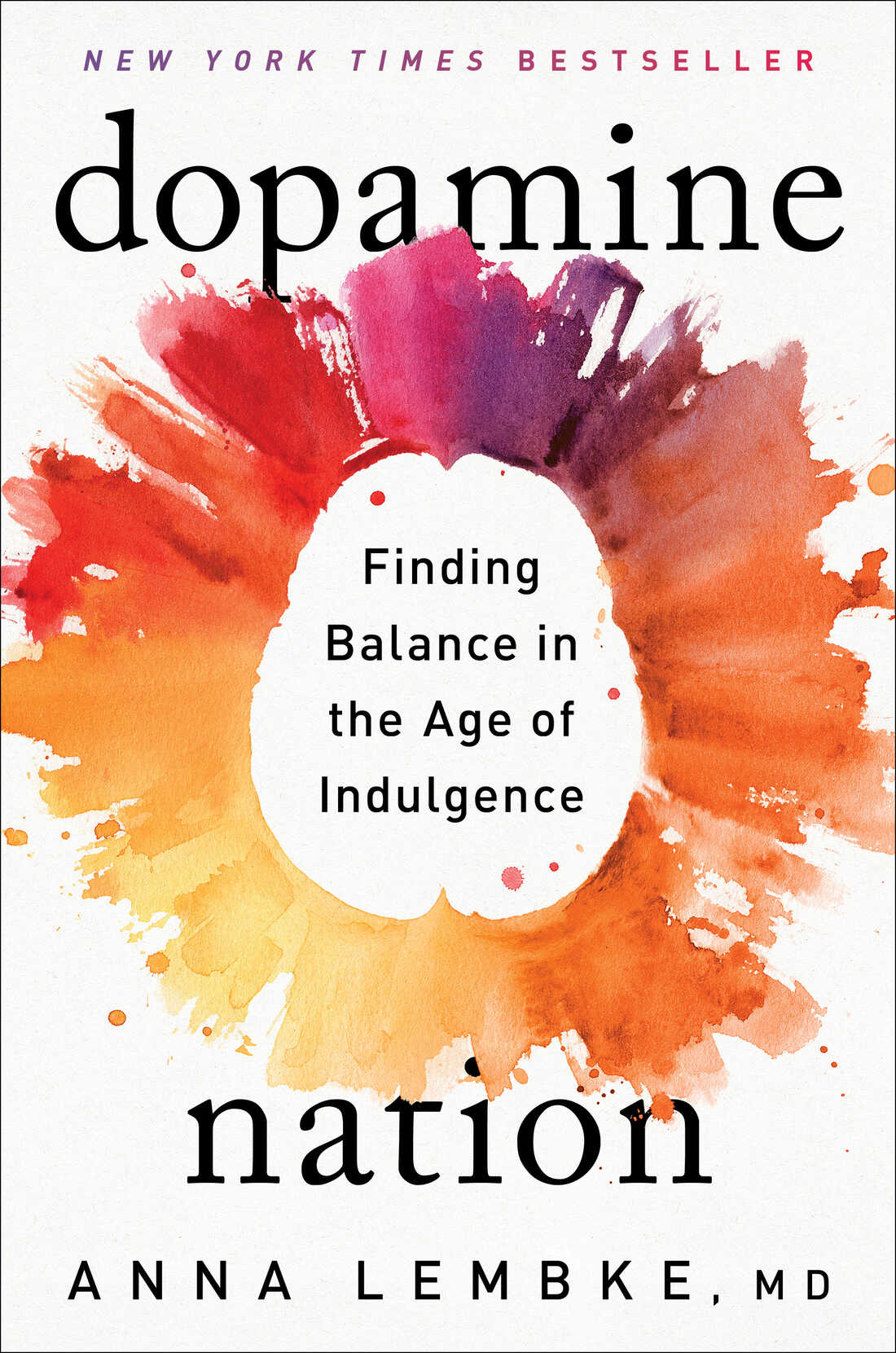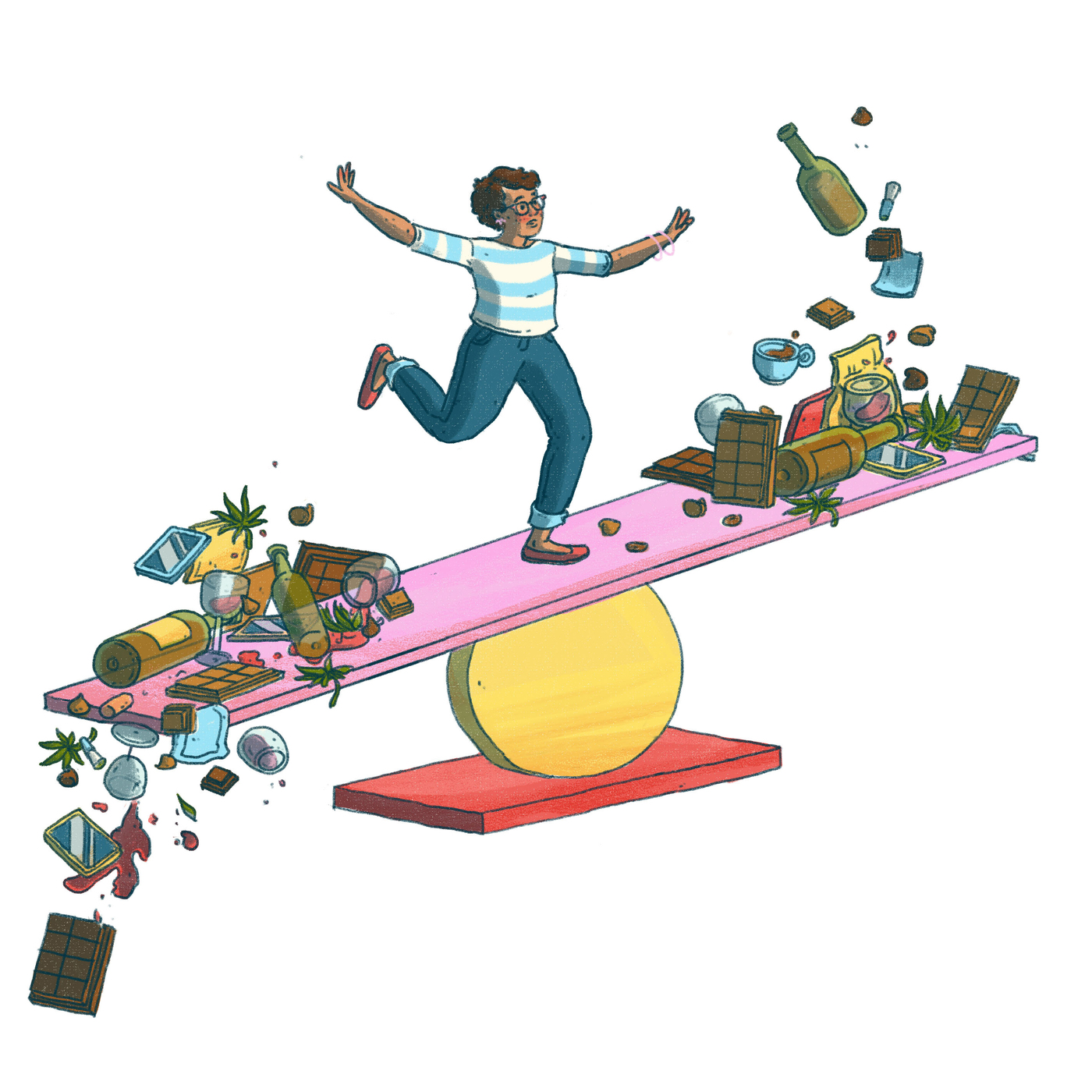[ad_1]

When we are repeatedly exposed to stimuli that produce pleasure (social media, sugar, alcohol, or any number of readily available substances), our bodies adjust. Then we need more on repeated use, just to feel a marginal boost of pleasure, and eventually just to feel “normal”. Meredith Miotke for NPR hide caption
toggle subtitle
Meredith Miotke for NPR

When we are repeatedly exposed to stimuli that produce pleasure (social media, sugar, alcohol, or any number of readily available substances), our bodies adjust. Then we need more on repeated use, just to feel a marginal boost of pleasure, and eventually just to feel “normal”.
Meredith Miotke for NPR
Whether it’s sugar, social media, or sex, the response in our brains is the same: it produces the “feel good” neurochemical called dopamine, which causes feelings of pleasure and motivation. “It may be even more important for motivation than for actual pleasure,” says Dr. Anna Lembke, a Stanford Medical School psychiatrist, researcher, and author of the new book, Dopamine Nation: Finding Balance in the Age of Indulgence.
A hit of dopamine produces pleasure, and then is quickly followed by pain, or a low, to keep us motivated. Lembke says this see-saw of pleasure and pain made sense in the time of early humans, when we had to constantly seek our basic needs: food, water, shelter. “It’s really an ingenious method of making sure it does what we do, it’s pleasurable. It doesn’t last long and it’s followed by pain because we’re immediately looking again,” he explains.

But in modern life, we live in a world of abundance rather than scarcity, and Lembke says our brains didn’t evolve for the “dopamine hose” of sugar, social media, television, the sex, drugs or any amount of dopamine. -Triggering stimuli so readily available. In short, says Lembke, almost every behavior has been “drugged.”
When we are repeatedly exposed to our pleasure-producing stimuli, our brains adjust and eventually we need more and more just to feel “normal” or not be in pain. This is called a “dopamine deficit state,” and the cycle that gets us there can lead to depression, anxiety, irritability, and insomnia.
“We cannot rejoice in more modest rewards,” says Lembke. “Now, our drug of choice doesn’t even make us feel. It just makes us feel normal. And when we’re not using, we’re experiencing the universal withdrawal symptoms of any addictive substance, which are anxiety, irritability, insomnia, dysphoria and desire”.
Ultimately, Lembke says, this is a universal problem, not limited to those of us who struggle with the disease of addiction that has come with modern life. And to restore our sanity, we must collectively rethink how to navigate a dopamine-overloaded world.

A hit of dopamine produces pleasure and is quickly followed by pain, or a low, in order to keep us motivated, says psychiatrist Dr. Anna Lembke. Meredith Miotke for NPR hide caption
toggle subtitle
Meredith Miotke for NPR

A hit of dopamine produces pleasure and is quickly followed by pain, or a low, in order to keep us motivated, says psychiatrist Dr. Anna Lembke.
Meredith Miotke for NPR
Break the cycle and restore balance
Start with a dopamine rush. Take a 30-day break from whatever it is you rely on for pleasure: social media, sugar, video games, sex, booze, booze, anything, really. This doesn’t mean staying cold forever, but this first month is key to regaining the pleasure-pain balance. It’s much easier to eliminate an addictive behavior completely at first, then reintroduce it in moderation.
Lembke warns that you’ll probably feel a lot worse before you start feeling better. But she says stick with it: After about two weeks, your brain’s pleasure-pain seesaw will begin to return to its natural balance, and you’ll be able to enjoy more modest rewards, like just a scoop of ice cream. or just an episode of a TV show.
There is one caveat: This is not the approach to take for highly addictive substances like drugs and alcohol. Tangling in turkey can cause life-threatening withdrawal and should be done under the care of a professional.
Place obstacles between you and your addictive behaviors
There are three ways to “unlink” from the behavior you are addicted to or set limits. Using these strategies can help you enjoy some version of this behavior without letting it take over.
- Physical self-joining: Create real distance between you and your addiction. This could mean just removing the addictive substance from your home and spaces. For someone who is addicted to video games, this might mean a separate laptop for work and one for gaming.
- Chronological or temporal binding: Fasting for 30 days from your addictive behaviors counts as chronological or time-related binding. This could also look like intermittent fasting for someone with a food addiction, or a time limit check on social media apps.
- Categorical binding: This means limiting yourself to certain kinds of “substances” — reality TV may be absorbing you beyond your control, but you can consume a sitcom in moderation. Cutting reality TV out of your life would be a categorical bond.
For long-term change, radical honesty and community are key
In his work treating people with addiction, Lembke says he sees the most success in long-term recovery when people can’t lie. He explains that while we’re often afraid to be radically honest with others because we think they’ll run, the opposite is actually true: radical honesty promotes intimacy. “And intimacy is an incredibly valuable and powerful source of dopamine,” she says. “We know that when we make intimate human connections, oxytocin binds to dopamine, releasing neurons in the reward pathway, and dopamine is released and it feels great.”
Another level of this involves being radically honest with ourselves. Lembke explains that if we tell ourselves stories that are not true, we will repeat our mistakes. But if we’re brutally honest about how flawed we are and how we’ve contributed to our own problems, we can work on those mistakes and navigate the future differently.
“People in recovery are modern-day prophets,” says Lembke. To maintain balance and sincerity, we must achieve a pleasure-pain balance, which, in a time of abundance and overconsumption, means intentionally avoiding pleasure and seeking the kind of intentional pain that keeps us healthy, like the ‘exercise or the exercise. resisting certain temptations.
“By doing this,” says Lembke, “we’ll reset the reward pathways and ultimately be much happier. It’s simple but not easy, but it’s worth doing.”
Elise Hu is also the host of the TED Talks Daily podcast.
The podcast portion of this story was produced by Audrey Nguyen, with engineering support from Kwesi Lee.
We would love to hear from you. If you have a great life hack, leave us a voicemail at 202-216-9823 or email us at LifeKit@npr.org. Your tip could be featured in an upcoming episode.
If you like Life Kit and want more, subscribe to our newsletter.
[ad_2]Source: Break the cycle of addiction with these strategies to keep dopamine in check: Life Kit: NPR
Methadone Clinic In My Area – Methadone Clinics New York City – Methadone Clinics USA















